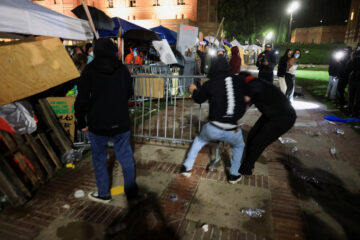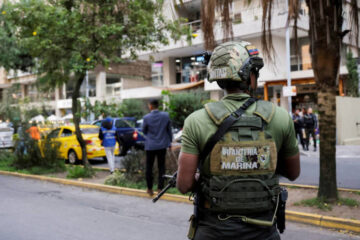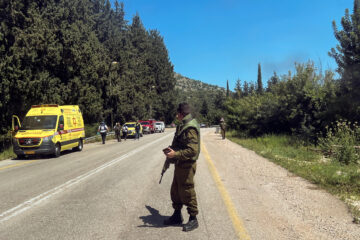Burundi says nearly 600 arrested over protests
Police in Burundi said Friday they have arrested close to 600 people during protests and clashes sparked by the president\’s bid to stay in power.
Protesters announced a two-day truce, but warned they would return to the streets on Monday unless President Pierre Nkurunziza backs down.
The United Nations voiced alarm over the central African nation\’s political crisis, saying the Nkurunziza\’s government was engaged in a brutal crackdown but "will not succeed in quashing dissent".
Social media has been blocked and radio stations have been shut down.
Sporadic clashes continued in parts of the capital Bujumbura on Friday, witnesses said, while hundreds of university students — whose student lodgings have been closed by the government — have been camping outside the US embassy, saying they want protection.
According to the Burundian Red Cross, at least seven people have died and 66 others have been wounded in nearly a week of clashes between police and protestors in the capital Bujumbura. Medical sources say many have suffered gunshot wounds since Sunday.
Police spokesman Pierre Nkurikiye told AFP that 577 arrests have been made, with nearly 250 cases sent for prosecution and 150 undergoing questioning. The remainder have been released.
A spokeswoman for the prosecutor\’s office, Agnes Bangiricenge, said those charged would be tried for "taking part in an uprising" and risked between five years and life behind bars.
A civil society leader on Friday called on protesters to stop demonstrating for two days and urged the president to "take advantage of these 48 hours to think about the consequences of his project and to give up by Monday".
"If not, we will return to the streets on Monday with much more vigour and we will not leave until he gives up his project," warned Pacifique Nininahazwe, who heads one of Burundi\’s main civil society groups.
Activists would meanwhile give the protesters killed in six days of clashes "dignified burials", Nininahazwe told reporters.
The unrest broke out after the ruling CNDD-FDD party designated Nkurunziza as its candidate in the next presidential election, which is due to be held on June 26.
Opposition figures and rights groups say that Nkurunziza\’s attempt to stand for a third consecutive term violates the constitution as well as a peace deal that ended a civil war in 2006.
Speaking in Geneva, Rupert Colville, spokesman for the UN human rights office, told reporters that Burundian authorities were engaging in a brutal crackdown.
"According to one credible report, over 400 individuals are being held in extremely overcrowded conditions, with detainees having to sleep standing up," he said.
"Detainees have also been beaten, particularly on their feet and buttocks, with some of those released having trouble walking due to the beating," he added.
On Thursday a US envoy warned the situation in the country was "very dangerous", and said Washington could impose targeted sanctions over the crisis.
"The position of the United States on the issue of a third term is one that is clear," said Tom Malinowski, the US Assistant Secretary of State for Democracy, Human Rights and Labor.
"The current situation is very, very dangerous, and that some of the measures that have been taken, including in recent days, to shut down social media, to suspend radio stations not only are wrong as a matter of principle but very counter-productive," he added.
The government was forced to move its scheduled May 1 parade from the city centre — to where demonstrators have been trying to march all week — to another part of the capital "so that protestors don\’t try to disrupt the event", Bujumbura\’s mayor Saidi Juma told AFP.
Nkurunziza, a former rebel leader and born-again Christian from the Hutu majority, has been in power for two terms since 2005.
His supporters say he is eligible to run again, since his first term in office followed his election by parliament — not directly by the people as the constitution specifies.
SOURCE: AFP
[do_widget_area inner_adsbar]










